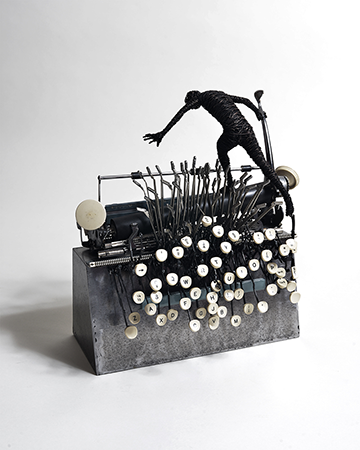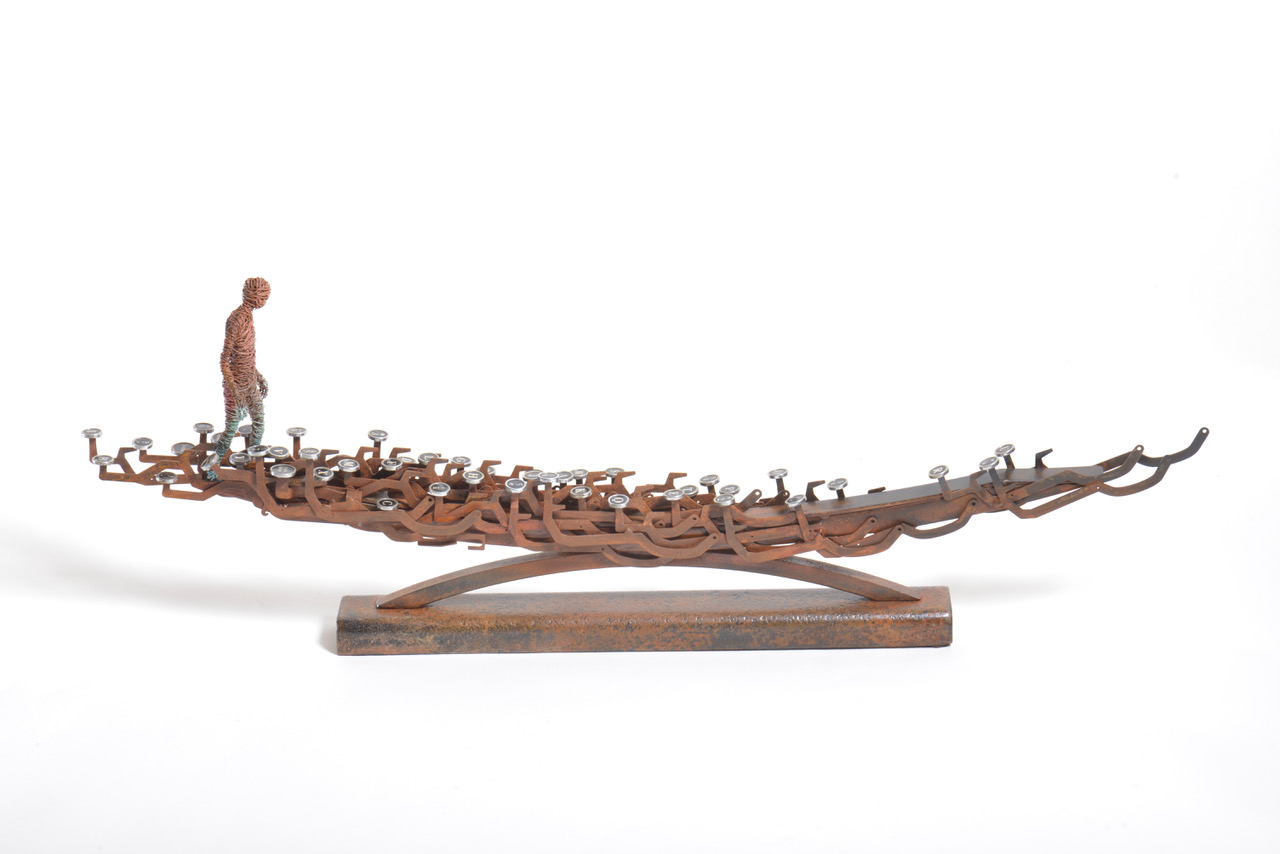
The 2024 Hybrid Grain Contest for Experimental Writing judges, Kate Siklosi and Jordan Abel, have this to say about experimental writing: “at its best, [it] invites the author to break free of familiar forms and structures, to disrupt and challenge the reading process, and to rethink language itself.” Reading this gave me goosebumps. Because what they’ve couldn’t have known, when they were composing their comments for the winning pieces, was the title of this Spring issue: “Disrupt the Illusion” (a phrase drawn from Catriona Wright’s short story, “Play Date”).
Disrupt is exactly what the contest winners have done—disrupt the illusion that writing must always be classifiable. Easily categorized. Conforming. The writers gather photos and seed packets, use collage, and even QR codes. Experimental or hybrid writing doesn’t conform. Neither does sculptor, and featured artist, Janis Woode. Woode’s metal sculptures are the epitome of unconforming hybrid work. As you’ll see, Woode gathers discarded bits of metal—often from objects thought of as having only one purpose—and generates something new. Just as writers and poets do, especially in hybrid writing. We borrow, reuse, and recycle to create a new “container,” to use Abel and Siklosi’s term.
This issue reveals not only a truth about writing and art, but also life. The human experience is a hybrid existence, and our writing is a reflection of this existence. “Oh for the liminal,” writes Diane Massam in her poem, “Something Tries to Go Dead in Us All theTime.” We yearn for the liminal, don’t we? Yes! I cry. Let me be it all! Not one thing or another, but everything. Let me live and create in the middle of the Venn diagram. Let me be complex, and complicated, and messy. Let’s disrupt the illusion of dichotomies, of value-based opposites, of language. Typewriter keys, wire, and chain; hands, bone, and flesh. We’re not just disparate parts. This or that. We’re hybrid. We’re whole.
- Elena Bentley, Editor
SOMETHING TRIES TO GO DEAD IN US ALL THE TIME | Diane Massam
and it is no wonder, amid twists of
outcrops through bramble vines, complexity
exhausts us, in the dry scrub of flaky
stone, old fire bleached, we are assailed by
angles, emptied out by entanglement.
Oh for the liminal: to hold fast one
moment with its lift of air, its unique
constituency of discernible
parts, to escape the full rush of hours
that leave us in pieces, that never rest.
Mind born of complicated oaks that I
stared at too long as a child, phosphene-etched
branches form veins in my eyes, windward whorls
scrabbling lichen on dust. Not like the
upward reach of regal fir, not like the
singular spire of kelp before it wafts
off into wild wet flame, not like the sweep
of cedar, draped like a heavy thigh, no,
oaks resemble sitar music I heard
in Tulum, with dark alleys, sharp corners,
tunnels that delve, then turn away. I am
tired of the stochastic, let me retreat
to a cave, tenderly cool, cupping clean
amber water where only one kind of
fish can live, sacrificing sight, no care
for colour, a dull, solitary fish,
quiet, and quite unused to visitors.
________________________
Citation note: Title is a line borrowed from Patrick Lane’s poem “Imago.”
PLAY DATE [excerpt] | Catriona Wright

For snacks, Goldfish crackers, a half-eaten jar of apple sauce, and three leathery clementines. Chloe’s daughter was probably accustomed to locally foraged berries and organic goat kefir. I should have gone grocery shopping yesterday, but I was so exhausted I boiled hot dogs and let Davy watch YouTube videos instead. Now I fussed around the apartment, wiping surfaces and vacuuming up snarls of hair and crumbs. I disassembled a fort and returned the buttress pillows to the couch. I stashed the brightest, most obnoxious toys in the closet and scattered the few wooden ones—hand-me-downs from my brother—in a way that, I hoped, felt lovingly chaotic (but not too chaotic). Whenever I turned around, Davy revealed a belligerent way to disrupt the illusion. The scorched stock pot had been hoisted onto the coffee table and filled with grubby, one-eyed stuffed animals, broken construction vehicles, and plastic Paw Patrol figurines. His yellow shorts were downy with grey dust. I emptied the diaper pail and sequestered the stinking bag on the balcony. Davy should be potty trained by now, but I just didn’t have it in me to deal with the power struggle and all the inevitable accidents.
I heard knocks on the door. Someone must have let them in; I hadn’t heard a buzz.
I sniffed my armpit, winced, and opened the door.
“Welcome,” I said, gesturing for them to enter. “Davy, greet our guests.” Davy ignored me.
Stiffly blond, Chloe and her daughter, Dora, wore matching lilac sundresses. They removed their matching white espadrilles (where did one purchase toddler espadrilles?) and entered, the daughter still squeezing her mother’s hand. Chloe deposited a large cognac-coloured leather satchel on my nubby grey couch.
“Let’s see,” Chloe said brightly, eyes darting around the room. Her facial expression revealed nothing about her assessment; I felt like one of her students, desperate to be reassured. She was well known at the university. A popular art history professor, specializing in female surrealist painters and known for being kind but rigorous. She was frequently featured in the monthly university newsletters, feted for securing yet another enormous grant.
I wasn’t deluded. I knew my apartment was humble, a rented one-bedroom in an older high rise (Davy and I shared a bed), which is why I’d initially suggested her house when, to my surprise and confusion, she asked about a play date. She’d insisted we go to mine, so her daughter “could experience a different environment.” I’d puzzled over this explanation, ultimately deciding to dismiss the whiff of condescension and take it literally. Maybe ‘different’ just meant ‘different’ and not, as I suspected, ‘worse’ or ‘poor.’ In my experience, professors weren’t the most emotionally intelligent people.
GORGEOUS UNKNOWN, YOU FICTION ME | Preeti Kaur Dhaliwal
after “The System” by John Ashbery
my reflection: waiting, woe, unknown—wander.
Bring me the avatar of sadness and passion, let her lie
with my inheritance, the detriment,
my pleasure dwindling my beasts, my heatedness, my ashes,
my tragic flaw and structure
living in the idolatry of my barren desert
a pregnant silence fictions me into outlaw, haphazard
eternity stealing small increments of time
against possibility and freedom: the present
grief, fruit me faith
submerge my waiting and debate
the sun: reward my efforts, point the way, whisper
the urge of each season, my desire
desiring acceptance of hardship and conceiving
her history. Unshuffle my tricks: every pause, the hullabaloo
from beneath my mother’s rib, angle the alphabet gorgeous.
My focus: a bare room, clotting unclotted blood.
Tradition me lightning and lotus—
necessitate the wander. I start and never finish.
EROSION [excerpt] | Tim Ryan

Inside the market it was early enough that the crowds weren’t too bad. I watched her select fruit and vegetables and offered to carry the bags. She chatted with the pork lady, and indicated the exact three fillets of salmon she wanted at the fishmonger’s. She asked the baker where he got his rye flour and offered advice to the florist on where to get a good set of secateurs. At the Mexican place, she got salsa and guacamole and chips, then added two bottles of that pink Mexican soda our daughter liked.
I did my best to stay out of the way.
When we’d got most of the items we came for, she asked, “Do you want to get a cup of tea or something while we’re here?”
“If you do,” I answered, unconcerned with the decision.
“I was asking you. I don’t think you eat enough.”
I followed her to a coffee stand at the far end of the market owned by a Colombian couple. They are first-generation immigrants who left everything behind to come to Canada. I don’t know what they did in Colombia, but they run a nice, clean coffee stand. They’re always pleasant, even if they can’t possibly always be in a good mood. She says they know their coffee. I wouldn’t know because I don’t drink coffee. Their son got into Yale and she likes to ask after him every now and then.
She got a latte. I ordered an English Breakfast tea. When the drinks came, we sat at one of the tables in the midst of the market throng. She checked her phone and I watched a sparrow flit from beam to beam up in the rafters. On our drives, I often told my daughter I wanted to come back as a bird. My daughter never asked me why. I like to think she never asked because the reason was obvious. Of course, it could have been because she didn’t really care.
“Do you think I could get a bagel?” I asked, wondering if we had time. She had a facial booked for later that morning and I didn’t want to make her late.
She put her coffee down and looked at me.
“That’s what worries me about you.”
I waited for it.
“How do I know if you should get a bagel?” she asked, a hint of anger in her voice. “I don’t want the responsibility for your decision.”
I didn’t know what to say.
“Lately, you give me the impression you’ve lost your confidence.”
I sipped my tea and looked across the dining hall. Above the head of a kid running a maple syrup stand was a large poster of Niagara Falls.
TO THE PIONEERS OF IDUNA | Allister White
a lily rests limp-necked before cool marble, petals splitting wide
i taste summer in the bow of my lip
it’s the softness of life/kindness i do not deserve/warmth her body wrapped around mine
lingering like a mother’s scent in the stairwell in her climb up hardwood step to attic
slowly, to stop the creak of age, the driving of fall/old train rattling in tune with her sighs
to the fox den in the yard only to find this land no almshouse
for love lost at loose threads/elastic band tourniquet fraying across prairie thigh/
my graveside offerings: fox blood pooled on barley, crimson stains blister across my blouse
your hands: a map, deftly slice through muskrat belly; your fist, a deathblow.
both of us kneel just west of the trapper’s cabin. howls escape
the steeljaw trap/foreign feeling of bodies thinning/high as heartbeats plateau.
hair matted, hands dirty from my sick/an exhumation. gazes buck at metal song
will you take her teeth to my ankle, her gums bloody again, this time with denial
and stumble as you lay me gently to the ground
dizzy at the scent of just-plucked ditch-callas




